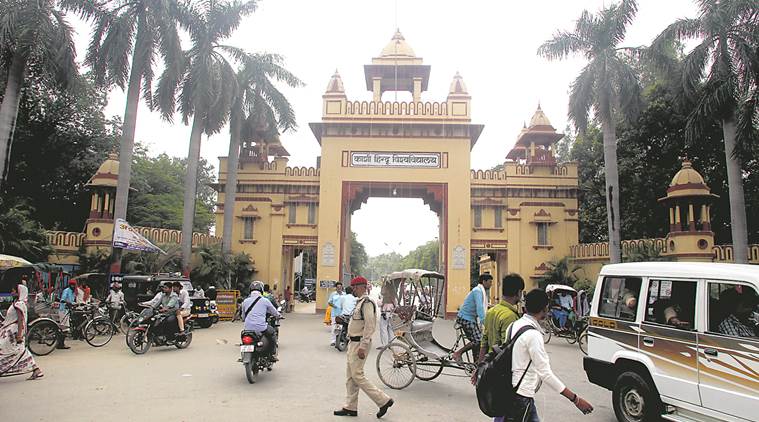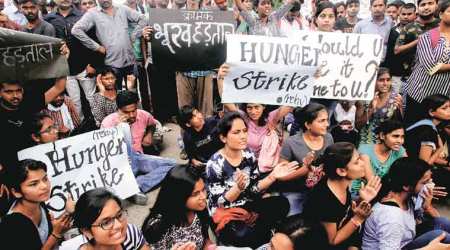We the women students of Banaras Hindu University
We are asking for basic freedoms. We demand institutional reform.
 Outside Banaras Hindu University. (Express Photo by Anand Singh/File)
Outside Banaras Hindu University. (Express Photo by Anand Singh/File)
A century after it was established, Banaras Hindu University is in the midst of a turmoil quite unique to its history. The reason for the current outrage cannot be simply understood through an instance of “eve teasing”. Instead, the ferment is a culmination of decades of festering resentment.
Governments came and went in the past, but the dominant ideology of “manuvaad” was never challenged on a campus where free thought and women’s rights were trampled upon. It was anger against this continued culture of suppression that was transformed into a massive march on the streets of Varanasi.
The idea was simple — students will organise a peaceful march to the office of the vice-chancellor and present their legitimate demands to the concerned authorities. At least that was the intention. The unprovoked and unilateral lathi charge on students and accompanying faculty members took us all by surprise.
The disproportionate response by the university authorities also shows why the outrage on the BHU campus goes much beyond the purported incident of sexual harassment. Authorities recognise that students are out on the streets to undo decades of attempts to stifle new, different, modern ideas. The energy on the streets bears witness to how long these ideas have been held captive at BHU, through intimidation and coercion. Students have been reminded to maintain order and discipline in times of interviews and threatened with summary expulsion. Let us not underestimate the force of the rage that it takes for students to come out and protest in the face of such repression. Any hope that the recent public attention would put an end to such practices in BHU remains yet unfulfilled.
The aakrosh (anger) goes wider. Only days before the incident, news began to trickle in that officials were exercising their discretion — a short-hand for their caste prejudices — in making appointments to the new vacancies that had come up on campus. No due diligence was followed in making such appointments and when students belonging to the depressed classes decided to voice their anguish at such practices, they were slapped with threats of expulsion. Students remained undeterred by such intimidation and continued their protests for two months and not only questioned the unconstitutional methods deployed for campus appointments but also included demands for longer opening hours for the university library.
The list of campus injustices is much longer. Take, for instance, deans of the zoology and arts departments and professors in the medical and geography departments who have been accused of harassment/molestation. O.P. Upadhyay, acting superintendent of Sir Sundarlal Hospital MS has been indicted for sexual assault. These men apparently enjoy impunity. Excesses have been committed over the past year and with no legitimate avenue to voice their concerns, students in these departments were silent up until this point.
Discriminatory practices on gendered lines are routine in BHU. Women students are not allowed to eat non-vegetarian food in their mess. They are not allowed to use mobile phones after 10 pm. Access to the internet in hostels has been strictly prohibited. They are told short dresses are against university customs. But do such customs apply to the male students on campus? Of course not. There are curfews in the main campus which apply only to female students. Women students are told that the campus is unsafe for them after 10 pm — are these looming threats on campus uninterested in male students? When female students complain against the quality of food and hygiene why does the VC ignore such legitimate concerns?
Students unions on causes are supposed to voice our concerns, be our representatives to ensure an environment of mutual cooperation. But what is to be expected from a VC who is more concerned with being noticed by Prime Minister Narendra Modi than with the students whose lives he has been entrusted with? A VC who has no time for a vibrant students’ union for fear of inviting the ire of the powers-that-be.
Students’ unions often get bad press — we are told students should study, not do politics. But what does doing politics really mean? On a campus where research scholars are not awarded their full HRA or there are deliberate delays in sanctioning UGC-mandated hostel facilities to research students, would highlighting such misdeeds be considered “political”? On a campus where the VC denies us our scholarships by charging that this money is funnelled to finance the dowry for women scholars, is it not our responsibility to be political?
The attack on students is yet to be registered by the local police; we have been forced to add another demand — that an immediate FIR is registered against the culprits. But then, what assurance can we expect from an extremely compliant police force. Only recently, a student was dragged out of the lecture hall in the presence of a professor and beaten up mercilessly in his hostel room. The police have refused to file a FIR against the goons who did this. Campus security, indeed!
And what about campus lighting and CCTV? Where does all the money for infrastructural development go? How do campus audits repeatedly fail to register the crumbling facilities in the science labs where students have been working and “trained” in the absence of the most basic apparatus? The discrimination on campus can be ended by acknowledging, first, how these prejudices have been engendered in quotidian practices.
The point is not merely to remove the existing VC, who must be asked to leave, but to undertake an institutional overhaul. We are asking for basic things — that the charter and constitution of the university is implemented in letter and spirit, that women are made safe on campus, not made its captive, and their voices are emboldened through a representative, functional and democratically elected students’ union.
